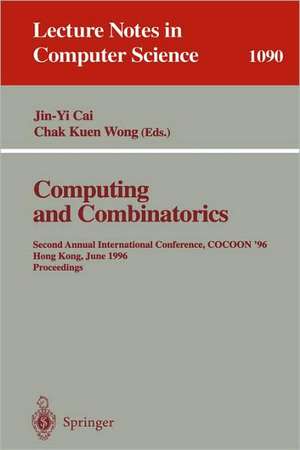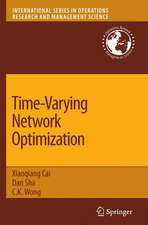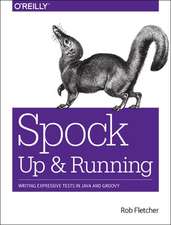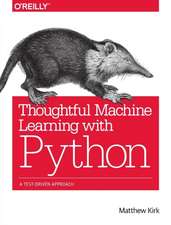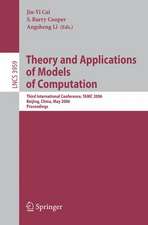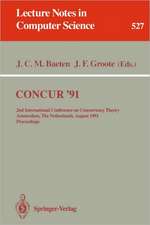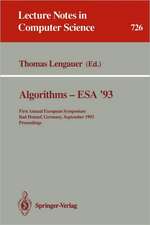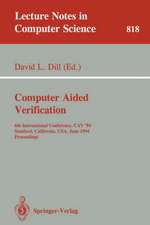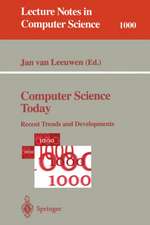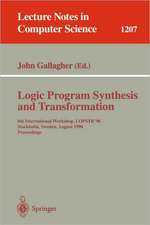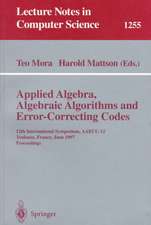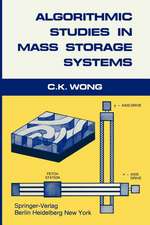Computing and Combinatorics: Second Annual International Conference, COCOON '96, Hong Kong, June 17-19, 1996. Proceedings: Lecture Notes in Computer Science, cartea 1090
Editat de Jin-Yi Cai, C.K. Wongen Limba Engleză Paperback – 5 iun 1996
The 44 papers presented in the book in revised version were carefully selected from a total of 82 submissions. They describe state-of-the-art research results from various areas of theoretical computer science, combinatorics related to computing, and experimental analysis of algorithms; computational graph theory, computational geometry, and networking issues are particularly well-presented.
Din seria Lecture Notes in Computer Science
- 20%
 Preț: 1061.55 lei
Preț: 1061.55 lei - 20%
 Preț: 307.71 lei
Preț: 307.71 lei - 20%
 Preț: 438.69 lei
Preț: 438.69 lei - 20%
 Preț: 579.30 lei
Preț: 579.30 lei -
 Preț: 410.88 lei
Preț: 410.88 lei - 17%
 Preț: 427.22 lei
Preț: 427.22 lei - 20%
 Preț: 596.46 lei
Preț: 596.46 lei - 15%
 Preț: 448.04 lei
Preț: 448.04 lei - 20%
 Preț: 353.50 lei
Preț: 353.50 lei -
 Preț: 389.49 lei
Preț: 389.49 lei - 20%
 Preț: 309.90 lei
Preț: 309.90 lei - 20%
 Preț: 645.28 lei
Preț: 645.28 lei - 20%
 Preț: 763.23 lei
Preț: 763.23 lei - 15%
 Preț: 580.46 lei
Preț: 580.46 lei - 20%
 Preț: 310.28 lei
Preț: 310.28 lei - 20%
 Preț: 655.02 lei
Preț: 655.02 lei - 20%
 Preț: 1183.14 lei
Preț: 1183.14 lei - 20%
 Preț: 340.32 lei
Preț: 340.32 lei -
 Preț: 449.57 lei
Preț: 449.57 lei - 20%
 Preț: 591.51 lei
Preț: 591.51 lei - 18%
 Preț: 938.83 lei
Preț: 938.83 lei - 20%
 Preț: 337.00 lei
Preț: 337.00 lei - 20%
 Preț: 649.50 lei
Preț: 649.50 lei - 20%
 Preț: 607.40 lei
Preț: 607.40 lei - 20%
 Preț: 1414.79 lei
Preț: 1414.79 lei - 20%
 Preț: 1024.44 lei
Preț: 1024.44 lei - 20%
 Preț: 583.40 lei
Preț: 583.40 lei - 20%
 Preț: 453.32 lei
Preț: 453.32 lei - 20%
 Preț: 575.49 lei
Preț: 575.49 lei - 20%
 Preț: 1075.26 lei
Preț: 1075.26 lei - 20%
 Preț: 585.88 lei
Preț: 585.88 lei - 20%
 Preț: 825.93 lei
Preț: 825.93 lei - 17%
 Preț: 360.20 lei
Preț: 360.20 lei - 20%
 Preț: 763.23 lei
Preț: 763.23 lei - 20%
 Preț: 340.32 lei
Preț: 340.32 lei - 20%
 Preț: 504.58 lei
Preț: 504.58 lei - 20%
 Preț: 369.13 lei
Preț: 369.13 lei - 20%
 Preț: 580.93 lei
Preț: 580.93 lei - 20%
 Preț: 343.62 lei
Preț: 343.62 lei - 20%
 Preț: 350.21 lei
Preț: 350.21 lei - 20%
 Preț: 583.40 lei
Preț: 583.40 lei - 20%
 Preț: 583.40 lei
Preț: 583.40 lei - 15%
 Preț: 438.59 lei
Preț: 438.59 lei - 20%
 Preț: 341.95 lei
Preț: 341.95 lei - 20%
 Preț: 238.01 lei
Preț: 238.01 lei - 20%
 Preț: 538.30 lei
Preț: 538.30 lei
Preț: 339.47 lei
Preț vechi: 424.34 lei
-20% Nou
Puncte Express: 509
Preț estimativ în valută:
64.95€ • 67.83$ • 53.64£
64.95€ • 67.83$ • 53.64£
Carte tipărită la comandă
Livrare economică 15-29 aprilie
Preluare comenzi: 021 569.72.76
Specificații
ISBN-13: 9783540613329
ISBN-10: 3540613323
Pagini: 440
Ilustrații: X, 430 p.
Dimensiuni: 155 x 235 x 23 mm
Greutate: 0.61 kg
Ediția:1996
Editura: Springer Berlin, Heidelberg
Colecția Springer
Seria Lecture Notes in Computer Science
Locul publicării:Berlin, Heidelberg, Germany
ISBN-10: 3540613323
Pagini: 440
Ilustrații: X, 430 p.
Dimensiuni: 155 x 235 x 23 mm
Greutate: 0.61 kg
Ediția:1996
Editura: Springer Berlin, Heidelberg
Colecția Springer
Seria Lecture Notes in Computer Science
Locul publicării:Berlin, Heidelberg, Germany
Public țintă
ResearchCuprins
Improved bounds for on-line load balancing.- O(n log n)-average-time algorithm for shortest network under a given topology.- Steiner problems on directed acyclic graphs.- Wormhole versus deflection routing: A case study on the mesh.- On sparse parity check matrices (extended abstract).- Finding a hidden code by asking questions.- Improved length lower bounds for reflecting sequences.- Combinatorial and geometric approaches to counting problems on linear matroids, graphic arrangements, and partial orders.- Output-sensitive reporting of disjoint paths (extended abstract).- Rectangular grid drawings of plane graphs.- Area-efficient algorithms for upward straight-line tree drawings.- Straight skeletons for general polygonal figures in the plane.- A note on uniform circuit lower bounds for the counting hierarchy (extended abstract).- A note on the simulation of exponential threshold weights.- Harmonic analysis, real approximation, and the communication complexity of Boolean functions.- Finding large planar subgraphs and large subgraphs of a given genus.- Efficient deterministic algorithms for embedding graphs on books.- Optimal bi-level augmentation for selective! enhancing graph connectivity with applications.- Exact learning of subclasses of CDNF formulas with membership queries.- Fast separator decomposition for finite element meshes.- Reduction algorithms for constructing solutions in graphs with small treewidth.- Fast RNC and NC algorithms for finding a maximal set of paths with an application.- Sparse suffix trees.- Depth-efficient threshold circuits for multiplication and symmetric function computation.- A note on the self-witnessing property of computational problems.- The inverse satisfiability problem.- The join can lower complexity.- On the distribution of eigenvalues of graphs.- On the difficulty of designing good classifiers.- Approximating latin square extensions.- Approximating minimum keys and optimal substructure screens.- Reductions and convergence rates of average time.- On the complexity of computational problems associated with simple stochastic games.- On the complexity of commutativity analysis.- Improved non-approximability results for vertex cover with density constraints.- Some notes on the nearest neighbour interchange distance.- Distributed computing in asynchronous networks with byzantine edges.- Weight biased leftist trees and modified skip lists.- Probabilistic analysis of local search and NP-completeness result for constraint satisfaction.- On the reconfiguration of chains.- Two-guarding a rectilinear polygon.- Three systems for shared generation of authenticators.- Efficient generation of elliptic curve cryptosystems.- Superconnectivity for minimal multi-loop networks.
